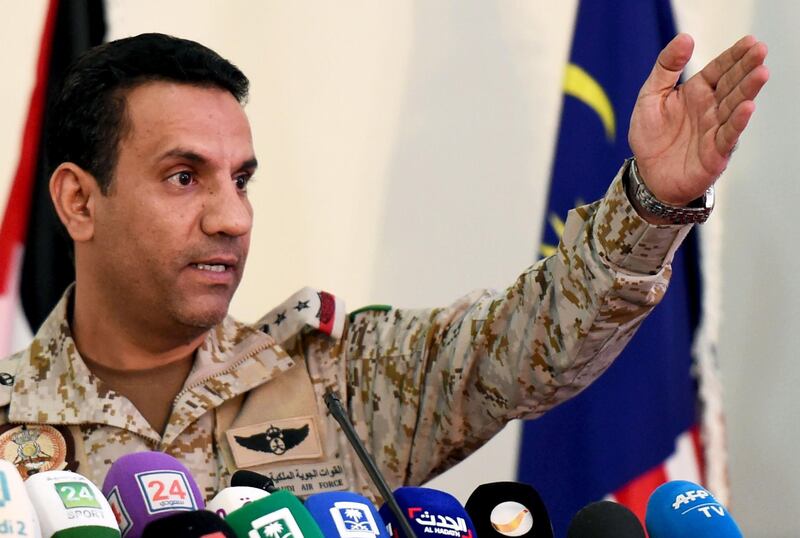Houthi militias launched mortar attacks on a hospital and fish market in the Red Sea port of Hodeidah, a spokesman for the Arab Coalition and a UAE official said.
The comments by Colonel Turki Al Malki followed reports of the incident on Thursday in Hodeidah, which is held by the rebels.
"The Arab Coalition did not conduct any operations in Hodeidah," he said.
"The coalition follows a strict and transparent approach based on international law. We will investigate any allegations, and if there is any responsibility on our part, we will be transparent," he said.
The Yemen government has called for more political pressure on the Houthis before peace talks being convened by United Nations Special Envoy Martin Griffiths next month.
Col Al Malki, however, said that the coalition's operations will continue until the city of Hodeidah and its port are liberated.
"The strategic goal of the coalition's operations is to reinstate legitimacy in Yemen," he said, referring to the government of President Abdrabu Mansur Hadi.
_____________
Read more:
[ UN envoy to Yemen announces Geneva talks in September ]
[ Houthis claim they will halt Red Sea attacks for two weeks ]
[ Yemen exports the first crude pumped since civil war began ]
_____________
UAE Minister of State for Foreign Affairs Dr Anwar Gargash, meanwhile, said a coalition investigation, conducted with the help of western allies, "found clear evidence that the damage was caused by mortar shells fired from Houthi territory".
"Zero coalition operations yesterday involved targets close to the hospital," he said in a tweet.
The Coalition’s investigation, carried out with Western allies, into incident in Hodeida found clear evidence that the damage was caused by mortar shells fired from Houthi territory. Zero Coalition operations yesterday involved targets close to the hospital.
— د. أنور قرقاش (@AnwarGargash) August 3, 2018
Mr Griffiths has proposed that a first round of peace negotiations will begin in Geneva, Switzerland, on September 6.
A coalition-led offensive to retake Hodeidah was suspended in early July to assist Mr Griffiths's mediation efforts.
However, Ahmed Awad bin Mubarak, Yemen's Permanent Representative to the UN, told the Security Council on Thursday that more pressure was needed.
"Peace will not be achieved only by expressing support for the efforts of the UN envoy to start the dialogue, but with more political pressure on the Houthi militias," he said.
Mr bin Mubarak said the council needed to take a firm stand on the Houthis retaining access to areas from which they were launching attacks on international shipping.
He cited the rebels' attacks last week on two Saudi oil tankers in the Red Sea as an example, as well as the planting of hundreds of naval mines targeting Yemeni ships and fishermen.
Saudi Arabia said on Saturday it would resume all oil shipments through the Red Sea that were suspended on July 26 after the attacks on its oil tankers in the strait connecting the Red Sea to the Gulf of Aden, known as Bab Al Mandeb.
"The decision to resume shipping of oil through Bab Al Mandeb comes after all necessary procedures were taken by the coalition leadership to protect ships of the coalition countries," the state news agency SPA quoted Saudi Energy Minister Khalid Al Falih as saying.
The Red Sea is one of the world's most important routes for oil shipments, with tankers heading from the Middle East through the Suez Canal to Europe. Bab Al Mandeb is only 20 kilometres wide, making hundreds of ships potentially an easy target.





